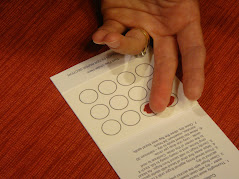How to assess your thyroid status
Assessing thyroid status is an easy process. As with many measures, what is not so easy is defining what is truly desirable or ideal for health. (More on that in future posts.)
The ingredients of a thyroid assessment include:
Ensuring adequate iodine intake
Neglect of iodine is a common reason to develop marginally low thyroid function. In my experience, about 20% of people are deficient. Ironically, the most health-conscious are most likely to be deficient, since they are more likely to avoid iodized salt, processed foods that contain iodine, and may even follow an "eat local" philosophy in iodine-deficient regions of the country.
Iodine is not optional--it is an essential trace mineral. Without it, health is impossible, thyroid and otherwise. While the Recommended Daily Allowance (RDA) for iodine is 150 mcg per day, this may not be the ideal quantity for health. Until we have clarification on the ideal quantity, I generally recommend obtaining 500 mcg iodine per day from kelp tablets, an inexpensive form that is widely available.
Assess thermoregulatory status
 It simply means taking your temperature.
It simply means taking your temperature.
I prefer oral temperatures, since they best track the circadian variation of internal temperatures, unlike surface temperature (e.g., axillary, forehead). Temperatures are best assessed using a digital thermometer immediately upon arising, aiming for a normal temperature in the vicinity of 97.3 degrees F. Temperatures consistently below 97.3 are suggestive of hypothyroidism (low thyroid).
Thyroid Stimulating Hormone (TSH)
TSH is actually a pituitary hormone responsible for regulating thyroid function: the higher the TSH, the poorer the thyroid function.
Most laboratories continue to quote a Reference Range (often mistakenly called "normal range") of 0.5-5.5 mIU/ml, even though several major studies suggest that cardiovascular events and even mortality are increased with TSH as low as 1.5 mIU/ml or greater.
I therefore aim to achieve TSH of 1.0 mIU or less.
Free T3
T3 is the principal thyroid hormone. (The "3" refers to the number of iodine molecules present per T3 molecule.) Low T3 represents low thyroid status. We aim for the the upper half of the "normal" T3 range.
Free T4
T4 serves as a respository for T3 and persists longer in the blood than T3. Low T4 signifies low thyroid. We aim for the upper half of the T4 range.
Iodine intake and temperature assessment can both be self-assessed easily.
Thyroid hormones can also be self-assessed with at-home blood tests, such as this offered through Track Your Plaque.
The ingredients of a thyroid assessment include:
Ensuring adequate iodine intake
Neglect of iodine is a common reason to develop marginally low thyroid function. In my experience, about 20% of people are deficient. Ironically, the most health-conscious are most likely to be deficient, since they are more likely to avoid iodized salt, processed foods that contain iodine, and may even follow an "eat local" philosophy in iodine-deficient regions of the country.
Iodine is not optional--it is an essential trace mineral. Without it, health is impossible, thyroid and otherwise. While the Recommended Daily Allowance (RDA) for iodine is 150 mcg per day, this may not be the ideal quantity for health. Until we have clarification on the ideal quantity, I generally recommend obtaining 500 mcg iodine per day from kelp tablets, an inexpensive form that is widely available.
Assess thermoregulatory status
 It simply means taking your temperature.
It simply means taking your temperature.I prefer oral temperatures, since they best track the circadian variation of internal temperatures, unlike surface temperature (e.g., axillary, forehead). Temperatures are best assessed using a digital thermometer immediately upon arising, aiming for a normal temperature in the vicinity of 97.3 degrees F. Temperatures consistently below 97.3 are suggestive of hypothyroidism (low thyroid).
Thyroid Stimulating Hormone (TSH)
TSH is actually a pituitary hormone responsible for regulating thyroid function: the higher the TSH, the poorer the thyroid function.
Most laboratories continue to quote a Reference Range (often mistakenly called "normal range") of 0.5-5.5 mIU/ml, even though several major studies suggest that cardiovascular events and even mortality are increased with TSH as low as 1.5 mIU/ml or greater.
I therefore aim to achieve TSH of 1.0 mIU or less.
Free T3
T3 is the principal thyroid hormone. (The "3" refers to the number of iodine molecules present per T3 molecule.) Low T3 represents low thyroid status. We aim for the the upper half of the "normal" T3 range.
Free T4
T4 serves as a respository for T3 and persists longer in the blood than T3. Low T4 signifies low thyroid. We aim for the upper half of the T4 range.
Iodine intake and temperature assessment can both be self-assessed easily.
Thyroid hormones can also be self-assessed with at-home blood tests, such as this offered through Track Your Plaque.




0 comments:
Post a Comment